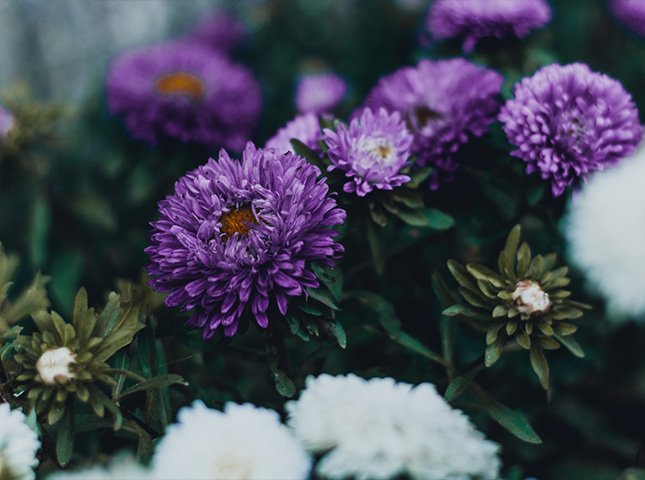Deer, with their insatiable appetites, have been known to munch on a variety of plants. But when it comes to asters, do these graceful creatures consider them a tasty treat? Let’s delve into the relationship between deer and asters.
Table of Contents
Key Takeaways
- Asters are a popular choice among gardeners for their vibrant colors and easy maintenance.
- While deer are known to eat a variety of plants, asters are not always their first choice.
- There are measures that can be taken to deter deer from feasting on your asters.
What are Asters?
Asters are beautiful perennial plants that bloom in late summer and fall, bringing vibrant colors to gardens when many other plants have finished flowering. They are known for their daisy-like flowers and can be found in a variety of colors, including purple, blue, pink, and white.
Deer’s Dietary Preferences
Deer are opportunistic feeders. This means they will eat almost anything when food is scarce, especially in the colder months. However, during times when food is abundant, they can be a bit pickier. While they might nibble on asters out of curiosity or due to limited food options, asters are not necessarily a favorite snack for deer.
Are Asters Deer-Resistant?
No plant can be labeled entirely “deer-proof,” but some plants are less appealing to deer than others. Asters fall into the category of plants that are deer-resistant. This means that while deer might occasionally nibble on them, they usually aren’t the first choice when other food sources are available.
Protecting Your Asters from Deer
If you find that deer are frequently visiting your garden and munching on your asters, there are several measures you can take:
Fencing
One of the most effective ways to keep deer out of your garden is to install a fence. Deer can jump high, so it’s recommended to have a fence that’s at least 8 feet tall.
Deer Repellents
There are various deer repellents available on the market. These can be sprayed on or around your asters to deter deer. However, they need to be reapplied regularly, especially after rain.
Plant Placement
Planting asters near other plants that deer dislike can deter them from approaching your asters. Plants such as lavender, rosemary, and sage are known to be unappealing to deer.
Other Plants Deer Love to Eat
While asters might not be at the top of the menu for deer, there are other plants that they absolutely love. Some of these include:
- Hostas
- Daylilies
- Tulips
- Roses
If you have these plants in your garden and are struggling with deer, it might be worth considering replacing them with more deer-resistant options.
Asters: A Beautiful Addition to Any Garden
Asters, with their vibrant colors and easy-to-care-for nature, are a favorite among gardeners. And the added bonus? They’re not a primary target for deer. By taking a few preventive measures, you can enjoy the beauty of your asters without the constant threat of them being devoured.
Frequently Asked Questions about Deer and Their Diet
Deer, with their varied diet, often leave gardeners puzzled about what plants are safe from their nibbling. Here, we address some of the most common questions regarding deer and their dietary preferences.
1. Why do deer eat certain plants and not others?
Deer choose plants based on several factors:
- Nutritional content: Deer seek out plants that provide the most nutrition, especially during times when they need more energy.
- Taste: Just like humans, deer have preferences when it comes to taste. Some plants are naturally more palatable to them.
- Availability: In areas where food is scarce, deer are less picky and might consume plants they wouldn’t otherwise.
2. How can I make my garden less appealing to deer?
There are several strategies you can employ:
- Plant deer-resistant plants: Opt for plants that deer typically avoid, such as lavender, sage, or foxglove.
- Use repellents: There are many commercial deer repellents available that can deter deer when applied regularly.
- Install motion-activated sprinklers: The sudden movement and spray of water can scare deer away.
3. Are there any natural predators that deter deer?
Yes, deer have natural predators like wolves, coyotes, and mountain lions. However, in many suburban areas, these predators are not present. Dogs can sometimes deter deer, but it’s not a guaranteed solution.
4. Do deer eat fruit from trees?
Yes, deer are known to eat various fruits, including apples, pears, and cherries. If you have fruit trees, it’s a good idea to protect them with fencing or netting.
5. How often do deer eat?
Deer are ruminants, which means they have a four-chambered stomach. They typically graze several times a day, often in the early morning and late afternoon. After grazing, they’ll find a safe spot to rest and ruminate (chew their cud).
6. Do deer eat flowers?
Yes, deer are known to eat a variety of flowers, especially those that are sweet and tender. Roses, tulips, and daylilies are among their favorites. If you’re looking to plant flowers that deer won’t eat, consider daffodils, marigolds, or snapdragons.
7. Can deer eat toxic plants?
While deer have a robust digestive system that can handle many plants, there are certain plants that are toxic to them. Yew, oleander, and foxglove are examples of plants that can be harmful to deer if consumed in large quantities.


